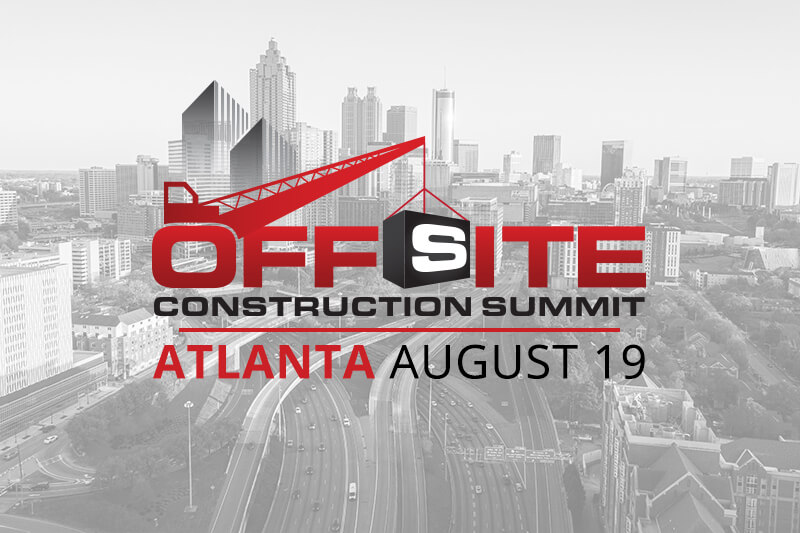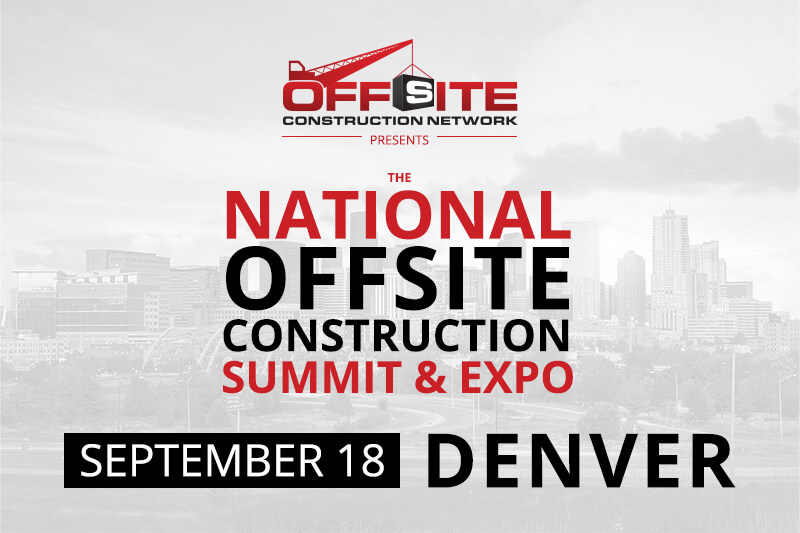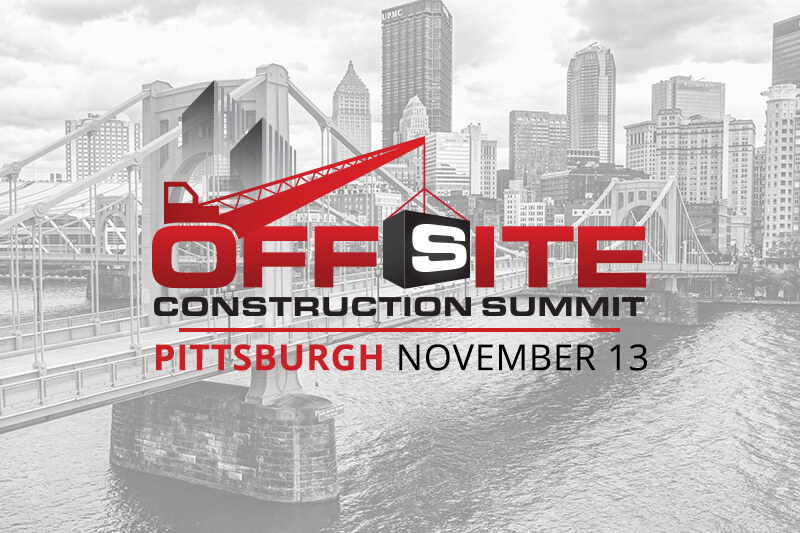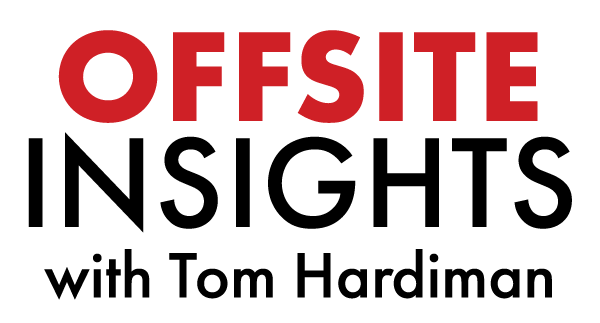
Old Problems, New Solutions: How Kit Switch is Switching Up Affordable Housing
An interview with Armelle Coutant and Candice Delamarre of
Kit Switch
Armelle Coutant and Candice Delamarre, CEO and COO, respectively, of Southern California-based start-up Kit Switch, join Tom Hardiman to discuss their fresh take on the affordable housing crisis.
Armelle and Candice also talk about the importance of inclusion and diversity within the construction industry.
Interview transcript
Tom Hardiman
Hello, and welcome to Offsite Insights. I'm your host, Tom Hardiman, and I'm joined today by Candace Delamarre and Armelle Coutant, cofounders of a California-based company called Kit Switch. Armelle, Candice, how are you doing today? Thank you for joining us.
Armelle Coutant
Thank you for having us.
Candice Delamarre
Doing great. Thank you.
Tom Hardiman
Thank you guys. I'm excited about your company. I want to hear all about it. I'm sure our viewers do too. Before we start, maybe Candace, can you tell us a little bit about yourself and your background? And then and then we'll jump over to Armelle and she can tell us her story.
Candice Delamarre
Yeah, sure. Thank you, Tom, for having us. So, in terms of my background, I'm an engineer by training, a civil and environmental engineer. I've been focusing on building energy efficiency on corporate sustainability. I think I've always been really concerned about housing issues around the world in general. And also super curious and intrigued about the circular economy, and how we could implement those in our daily lives. So this is kind of what led me to work on Kit Switch with Armelle. And now I'll let her introduce herself a bit more, because we have pretty complementary backgrounds.
Tom Hardiman
Excellent, thank you.
Armelle Coutant
I have a background in biology and architecture design. So a bit of a broad combo, but one that I think makes a lot of sense when we think about designing cities that are responsive to both the people that live within them and the environments that surround them. That's something that I'm really passionate about when it comes to our urban systems, as well as more broadly, quality housing as a human right.
Tom Hardiman
I wouldn't have thought a degree in biology would have led to a career in construction. But here we are.
Armelle Coutant
Exactly.
Tom Hardiman
Why don't you tell us a little bit of the story about Kit Switch. I know a little bit about it. It's super exciting, I think, but tell us the how and the why you started this company, if you don't mind.
Armelle Coutant
Absolutely. Kit Switch really started with the team, were a team of five co-founders. And we had worked together on different projects before and really cultivated a sense of really enjoying the work that we did together. And then the COVID 19 pandemic hit. And we were seeing these these trends that existed in real estate before when it comes to buildings being sometimes underutilized or vacant, depending on changing needs. But the pandemic really brought that to the forefront. And we just saw these two pain points of buildings that were now sitting vacant, completely underutilized, and some permanently. And then still, this rising demand for more affordable housing options. And, and it's at that nexus Kit Switch really started was, was thinking through, "well, how can we offer an end to end tool for the adaptive reuse of our buildings?" And that's where that's where everything started.
Tom Hardiman
Well, that is interesting, because, you know, there are so many vacant buildings, so many underutilized buildings across our country. And you're right. COVID really highlighted a lot of pain points in our infrastructure, housing for certain. Health care, in addition. We saw a lot of agencies and cities, trying to reconfigure convention center spaces into triage centers. And, you know, I can only imagine if they had a product like yours, it might have been a little easier for them.
Tom Hardiman
Well, tell us a little bit, maybe some of the successes you had today. I think I read that you were doing some work with Habitat for Humanity in Los Angeles. Is that correct?
Candice Delamarre
That's correct.
Tom Hardiman
Okay. Can you tell us about that one or any, any other successes?
Candice Delamarre
Yeah, it's interesting, talking about successes, because I think as a young startup, and potentially anyone who leads a company we're always focused towards in the future, what are the next steps with one or two more, but it's always good as a team to reflect on the milestones we've taken. And it's something we've really thought about a lot. I think it started pretty early.
I think a general, conceptual success is the way we've been able to engage with people, even in the very early days of coming up with this idea. And so we've been learning a lot through, you know, our prototyping and iterating on product design. Those have been great successes for us, but as well as you know, basically being resourceful and I would say, through engaging with people and we've joined different funding programs that were really high quality programs.
More recently It's also a very tangible, I would say successes such as working with Habitat for Humanity, no finding. Just working with an organization that's mission driven like we are super aligned with what we do in terms of housing in terms of sustainability, that they already have, you know, circular economy programs and rehab programs that work towards homeownership. So for us, it's been, it's been an incredible opportunity, and being sure we were cultivating that and working hand in hand to make this happen is, is just an incredible partnership. So yeah, probably one of our best successes today.
Tom Hardiman
Excellent. Well, let me break this down. Because I think I understand your actual business model. You're you're targeting large, vacant commercial properties, like a big box store or a mall that's no longer viable. And then your company is designing panelized systems that could go in and retrofit these vacant properties. So you kind of create a win-win: you utilize an existing property, that you create housing opportunities, as well as that. Cover that well, if not, please correct me.
Armelle Coutant
Yeah, absolutely.
Tom Hardiman
That was it. That's the model? Well, you know, I don't know that I've heard of theat model. I've heard certainly wall panel companies in the housing space. But I don't know that I've heard of anyone targeting existing vacant commercial properties. Which I love, because they're just such a blight when there's these huge properties are just sitting there empty. So appreciate that.
Tom Hardiman
Armelle, maybe you can talk a little bit about, what are some of the challenges you're seeing early on in this this model? Because I imagined when people hear this that, in fact, they might think, "oh, yeah, that'll never work." You know? That's a terrible idea. Why would anyone want to do that? So are you hearing any of that? Or what are some of the challenges you've seen or face so far?
Armelle Coutant
Yeah, that's a fantastic question. I think we've been very lucky in that there are just so many of these buildings that we've still been met with quite a positive response. And a lot of people have come to us with buildings, and are just very intrigued about exploring this new way of utilizing their space and this new model.
But it definitely is a very challenging intersection that we've chosen because of that very reason,. We're bringing two sort of pain points together, and creating an opportunity from there. And something that was very important to us is knowing that these building types can vary a lot and be very different. And that we're working in an industry where collaboration is key. And there's a lot of different players. What that meant for us is being able to create a product where we can run it through lots of different scenarios, and make sure that it can work for different building types, different project types. And that effectively means front-loading a lot of design work and, and really thinking through all of the different possibilities from the get-go. And that's a lot to take on, especially as a small business with limited resources. But it's definitely a challenge that we've we've chosen to take and to undertake, because we really believe in this vision of by creating this standardized panelized system that can be installed in different types of buildings, that will then create a lot of value on the long term.
Tom Hardiman
Absolutely. Are you are you getting a lot of support from like local government code officials, agencies, things like that? Because I imagined that might be a roadblock if it were not for the huge housing problems we're having I could see zoning issues, for example, you know, how are you going to put housing and where a mall used to be?
Armelle Coutant
Exactly. And that's going back to Candice's point about we really started by talking to a lot of different people. And so we brought cities and counties into the conversation very early on. And that's that's kind of the perspective we want to have is, you know, to tell them, "Listen, if you want to meet these affordable housing targets, let's take a look at your plans. Let's take a look at zoning. Let's see, are there already some opportunities in places that are already zoned for mixed use? And if not, what are some really good opportunities to maybe provide some some exception to the zoning laws."
So being able to have that process be collaborative rather than going to the city right at the end of a project just asking for a permit has been a really important piece for us.
Tom Hardiman
Early communication and collaboration smart thinking, smart thinking.
Okay, let me let me shift gears here a little bit because I was on your website and as I often do, I click on the About Us section and your about us section looks a whole lot different than just about any other company than I've seen in the construction industry. So why don't you tell us a little bit about some of your other co-founders, your team? And maybe maybe the vision for Kit Switch.
Candice Delamarre
Sure, I'll jump in on on this one. Yes, our About Us page does look very different because our About Use are five women, young women, some have different, you know, backgrounds, different colors. And it's something we are really proud of. And it's also one of the motivations for Kit Switch and for making it happen.
Candice Delamarre
In terms of advice, our challenges we face or, and how we see them, I think it's really about being aware of our difference, saying that, yes, there is a difference, but not really leveraging it, instead of seeing it as an obstacle, or a barrier. What I mean by that is, we know that this is a thing, we know that inclusion is so important to our team. So it's something we want to implement, like implement DEI initiatives on a day-to-day when it comes to hiring. But also when it comes to interacting with suppliers customers, make comes to partners just really listening to people understanding that we don't know better than everyone. And we also don't know less than everyone. Really being in that listening mode and learning from people. But also, like, kind of truly engaging with people like sharing really your personality, because yes, I'm not like most executives in construction. But if you share a little bit about yourself, there are always commonalities are always personal things people share, and so bonding on other things that potentially they typically bond over is important.
Candice Delamarre
And, and my point about being bold, and making sure it's not a barrier, I think, you know, we're, we're startup we're here to bring radical innovation. So being bold in the sense where yes, we're women, but it's not because we don't conform to the norm, initially, that we should conform to all of the norms in construction,. Like, yes, like, we don't conform, that's not, you know, let's not stop there, let's use it and, and really change the status quo. And that translates into a lot of conversations we've had about our product design, you know, and to what extent where do we draw the line between a little small change, a little innovation, or a radical innovation that we know could have a real impact? Makes it volunteers. And I know Armelle has a lot of that stuff, because we we talked about that.
Armelle Coutant
Do I think it's um, I think it's a really good question to bring up and, and exactly, as you said, you know, at the end of the day, people of different gender and racial identities are underrepresented in our industry. And so also, in an industry where a lot of the leadership pages are primarily white men, it's also advice for them to you, as well really rise to this opportunity at the end of the day and responsibility to make space for others.
And then, you know, as for other women, I think, who are considering a similar career, I would say there's also a lot of power and looking to each other and recognizing each other being able to, to advocate for each other and speak up if you see a woman who's working really hard and not being recognized, or being given the same opportunities. And so that type of community is part of our vision for Kit Switch I think in a lot of ways is to create both a company culture and a product where anyone and anyone can feel welcome to engage with it.
Tom Hardiman
Excellent. I heard a lot, a lot to unpack there. I heard you say let's look at DEI as an opportunity. And so many times people kind of frame it as a problem. "We have a problem." No, we have an opportunity. Every company I know every company I've been involved with has labor shortage issues. And yet, women and minorities are still dramatically underrepresented in our industry. And I keep thinking "there's got to be a solution here." Why don't we more fully utilize some readily available talent? So, so glad you guys are out there doing what you're doing.
As a young startup company, where did the entrepreneurial drive come from? Because I imagine any of the five of you could have gone to work for any number of firms and had an impact in and of yourself and with that company. What was the the genesis of let's all get together and start this company. Who's the entrepreneur behind this?
Armelle Coutant
That's a really funny thing, because I would say there isn't necessarily one. We're a team of architects and engineers primarily. And so none of us, I think, really went into Kit Switch with the goal of making a successful startup. It really was, I believe that the product and the vision that it started at almost as a thought experiment where we really, really cared about these issues, and we got together and thought, "Okay, if if, rather than maybe working in a bigger system and trying to change it, if we had all the tools, what would we create? What would we offer the industry if we were the ones calling the shots?" And that was the thought experiment that it started with. And then we're so lucky to have enough traction into the port that the business emerged out of it. I'd love to hear Candice's perspective as well.
Candice Delamarre
Yeah. That's interesting. I think. It's a lot about the opportunity that we let landed on this idea. And at some point, I felt like, I personally felt like it was almost my duty to, to take it forward. Because we were on this great idea and people were convinced and, and I was like, we we should, we should spend time exploring this. And realizing that there are different ways right to try to make an idea come to fruition. And we did think of what was the best way was it to work on this part time was it to do research, while we're still at Stanford. But according to us, the best, most efficient way to test it fully and test whether it would be commercially viable was to work on that, like, full time, check whether our customers would engage and pay the price whether we could make this manufacture this. And it's been a great journey. Definitely. tiring and exhausting, sometimes, but the motivation is there. So as long as the motivation is there, I think we could, we could accept almost anything.
Tom Hardiman
That's great. So the mission was really like, "look, we have an obligation to this mission, we have a duty." I love it, the best way to make changes is just "let's go do it. Let's just go do it."
Well, that's that's fantastic. Anything else you want to add, Armelle? You mentioned some good tips for for other women who are who are considering a career in construction, I would love to see, you know, just a floodgates open on this. And I think there's so many opportunities out there for art, not only construction as a whole, but our piece of it the off site and then panelized and modular industry, maybe more so than the construction industry. Any last thoughts to share before we wrap this thing up?
Armelle Coutant
I think I think your questions are wonderful. And we touched upon a lot of different things. Something that I would conclude with is that even though we are just getting started, and we're a young business, we definitely believe in also sharing what we know and giving back support if we can. So I think just an invitation to other people in the in the industry, if anything resonated to definitely go to our website and and fill out the contact form because we're, we're definitely open and willing to talk and to help in any way we can.
Tom Hardiman
And that website address is...
Armelle Coutant
www.kitswitch.com
Tom Hardiman
Kitswitch.com. Keep it simple. Well, I do appreciate you sharing your best practices and information here. California based or you try to stay within a certain region for now as you as you start up or you're looking to, to looking at other properties and other states or is it primarily Southern California at this point?
Armelle Coutant
We're starting with Southern California, but definitely open and flexible. Candice, would you say the same? Yeah.
Candice Delamarre
Yeah, I was gonna say for the sake of shipping our hardware products, Southern California, for now is kind of the focus. But we, as Armelle said, also like learning from us also learning from each other. Adaptive reuse has been carried out around the country in New York City, Chicago, Detroit anywhere. And so we learn a lot from looking at case studies of projects that have been done. So anyone who reaches out for that, or we do have other services we can provide related to adaptive reuse and assessing buildings, which doesn't have to be tied to California.
So there's any interest really on the design portion, I would say in the upstream part of a project when it comes to assessing what would be a good fit for that to reuse. Definitely reach out. same website.
Tom Hardiman
Yeah, I know housing is an issue everywhere and I know vacant commercial property is an issue everywhere. So it sounds like an idea that can travel across state lines for sure. I would just maybe caution you or recommend that you might get inundated with a ton of people who want to invest in this company. I think it's fantastic idea. I wish you all the luck in the world and anything we can do to help you out, we'd be glad to see you succeed and put a dent in this housing issue. So thank you again, Candice and Armelle, for joining me today. I appreciate your time and again, go to kitswitch.com check them out, fill out their contact form and listen and learn from them. Thank you guys.
Candice Delamarre
Well, thank you, Tom.
Tom Hardiman
Thank you, Candice. Thank you, Armelle. And thank you for tuning in to another edition of Offsite Insights. We appreciate Kit Switch sharing their ideas with us today and stay tuned for our next episode. Thanks, guys.
Don't Miss Our Upcoming Events!
Join the leading companies and professionals from across the offsite construction industry at each of this year's Offsite Construction Network events. With summits and expos taking place across North America in 2025, it's never been easier to connect with and learn from offsite construction manufacturers, designers, builders, and suppliers from the United States and Canada.
Subscribe today to get the latest updates on future events from the Offsite Construction Network.
